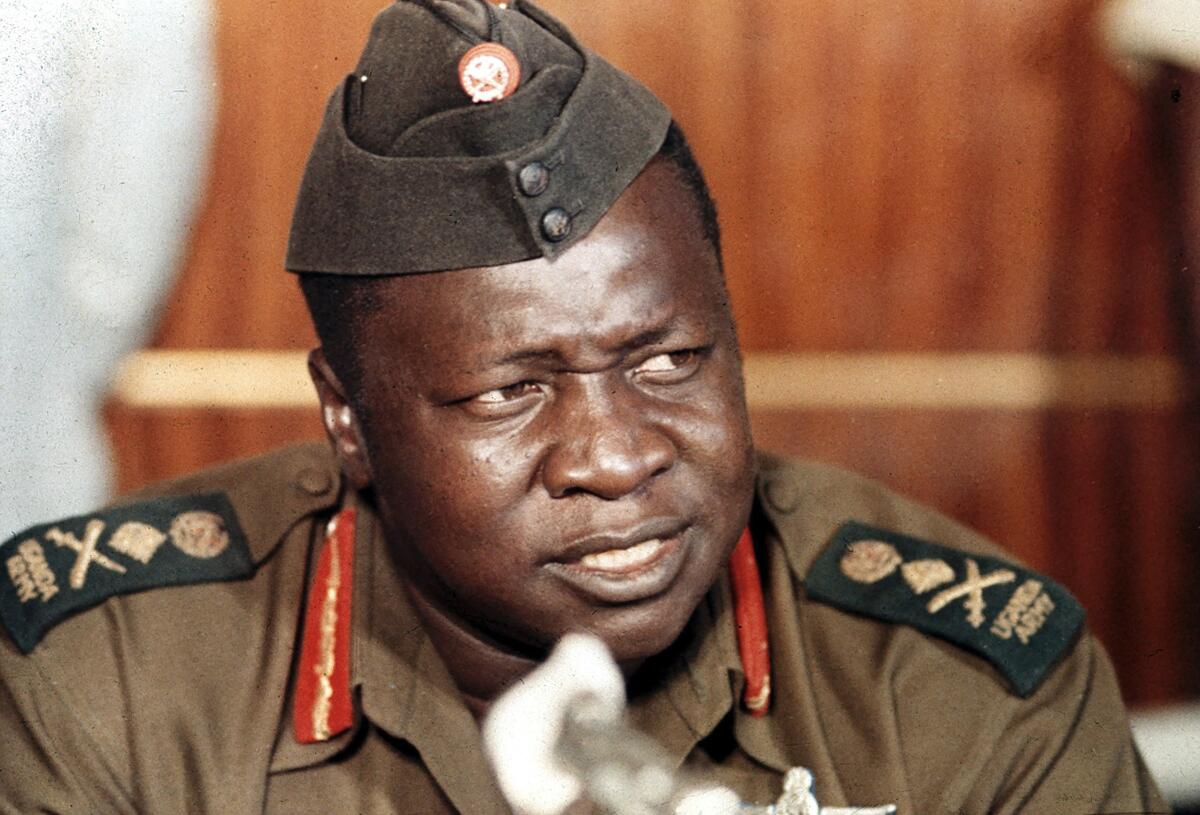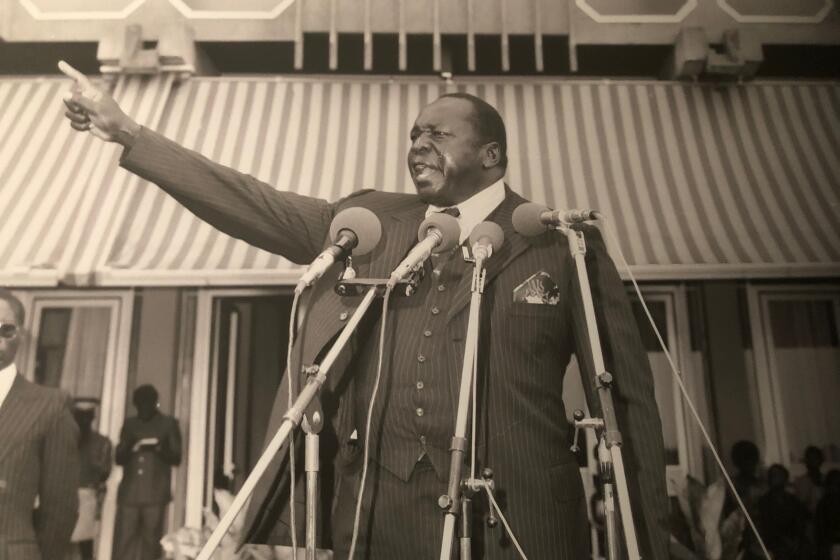Uganda divided over the tainted legacy of late dictator Idi Amin

- Share via
KAMPALA, Uganda — Can Idi Amin be rehabilitated?
The question is animating some in this East African country two decades after the death of one of Africa’s most infamous leaders with a documented record of human rights abuses.
Amin, who took power by force in Uganda in 1971 and ruled until he was removed by armed groups of exiles in 1979, died in Saudi Arabia in 2003.
His passing was barely acknowledged in Uganda, and some of Amin’s supporters over the years have unsuccessfully lobbied to have his remains returned home, underscoring his tainted legacy.
President Yoweri Museveni, whose rebel group was among those that ousted Amin with the help of Tanzanian troops, regularly dismisses Amin, and has described him as “a primitive dictator.”
There are no monuments to Amin in Kampala, the capital, where not even a street is named after him.
But some Ugandans want to change that — not to emphasize Amin’s tyrannical rule, but to highlight any positive aspects of it, including what they say was his commitment to local industry and African solidarity.
They have incited fierce debate over Amin’s legacy at a time when many Ugandans are hungry for political change, after nearly four decades of Museveni’s presidency. Museveni, in power since 1986, has not said when he would retire.
Museum exhibitions dedicated to the ‘butcher of Uganda’ are the country’s foray into the market for macabre tourism
The effort to memorialize Amin is led by a former lawmaker from his home region who asserts that Amin was defamed by international reporters who sometimes falsified stories about him. He says Amin deserves a more balanced verdict, but faces resistance from those who say Amin should just be forgotten.
An Amin memorial lecture, to be the first of its kind, failed to happen as planned in September because it didn’t receive approval from the education ministry.
Hassan Kaps Fungaroo, the former lawmaker leading the effort, later wrote to education officials asking for support in the creation of an Idi Amin Memorial Institute. The matter reached Museveni, who characterized Amin’s rule as “clearly illegal” and then rejected the idea of such an institute.
“It is not acceptable to license an institute to promote or study the work of Idi Amin,” Museveni said in his response to the education ministry. “It is enough that forgiving Ugandans forgave the surviving colleagues of Idi Amin. Let that history be forgotten.”
That verdict has sparked rebuttals from Ugandans who see some similarities between Amin and Museveni.
Like Amin, Museveni took power by force and is heavily reliant on the military to remain in power. And the president’s critics cite rampant corruption, abuse of public resources, police brutality, and the shrinking space for perceived government opponents, arguing that Museveni has no moral authority to judge Amin.
Idi Amin, who ruled Uganda in draconian fashion from 1971 until 1979, said Saturday that he will help the leaders of the coup in his East African homeland if they allow exiles to return.
“Mr. Museveni thinks this country started with him and that he has performed miracles,” Joel Ssenyonyi, a lawmaker and spokesman for the opposition National Unity Platform party, told the Associated Press. “Our past leaders made mistakes, without a doubt, which Museveni likes to capitalize on, but he has done worse.”
While Amin was semi-literate and never pretended to embrace democracy, Museveni has “captured all institutions” during his nearly four decades in power, Ssenyonyi said.
Responding to criticism online of Museveni’s directive, government spokesman Ofwono Opondo contended that a memorial to Amin may “glorify him but cannot undo his terrible deeds done in full view of many people, some still alive.”
The suggested institute is an attempt to “whitewash” Amin’s legacy, Opondo said.
Amin’s supporters and some academics point out that he was instrumental in acquiring or maintaining national assets at home and abroad, including a railway service, a national carrier, and multiple buildings housing Uganda’s foreign missions. They say he also was committed to the nurturing of local talent in music and sports.
“The Last King of Scotland” is not based on a true story.
But Amin’s crimes are widely documented. A onetime heavyweight boxing champ and soldier in the British colonial army, he seized power in a coup d’état and became a paranoid dictator whose government was accused of carrying out extrajudicial killings, disappearances and public executions. Between 100,000 and 500,000 people were killed during Amin’s rule, according to Human Rights Watch.
Some of Amin’s actions drew harsh international attention upon Uganda. In 1972 he ordered the expulsion of tens of thousands of Asians involved in controlling the country’s economy, sparking economic chaos.
In one notorious international incident during his reign, a Palestinian group hijacked an Air France airliner to Uganda’s Entebbe Airport in 1976 and held its Israeli passengers hostage. Israeli commandos flew to Entebbe under cover of darkness and rescued the captives. Amin claimed he wanted to help negotiate a peaceful resolution despite some evidence he’d collaborated with the hijackers.
Former Ugandan dictator Idi Amin, expelled by Zaire when he tried to enter the country under an assumed name, was forced to return here Friday after Saudi Arabia declared him persona non grata .
Amin had almost no allies in the international community by the time he lost power. He fled to Libya, then Iraq and finally Saudi Arabia, where he was allowed to quietly settle down.
Museveni, a U.S. ally whose government regularly receives substantial foreign aid, says that Uganda would be stronger economically if Amin had never been president. Some Ugandans frown at that, saying Museveni has had plenty of time to make his own mark.
“The debate surrounding the proposed Amin institute shows how Museveni’s rule has polarized Ugandans,” said Gerald Bareebe, a Ugandan who is an assistant professor of politics at York University in Canada.
“While many Ugandans abhor Amin, there are some who see similarities with Museveni’s rule,” Bareebe said, “especially given the rising cases of forced disappearance, torture, extrajudicial killing and detention without trial under Museveni’s regime.”
More to Read
Sign up for Essential California
The most important California stories and recommendations in your inbox every morning.
You may occasionally receive promotional content from the Los Angeles Times.














